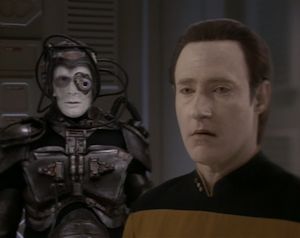| |||||||||||
| |||||||||||
|
Spoiler-free notes: The actor who plays Einstein in the opening scene also plays him in "The Nth Degree." Also, Stephen Hawking rules. The episode starts in the middle of Hawking telling a joke that deals with the perihelion procession of Mercury. The perihelion procession of Mercury was long considered one of the greatest flaws in Newtonian physics, as none of Newton's equations could make sense of it, but Einstein was the man who was able to figure it out using General Relativity. Thus, Einstein gets the joke, but Newton does not. The opening credits occur during the teaser, which is odd. When Worf suggests the attackers might be Ferengi, Riker remarks, "This seems brutal, even for the Ferengi." When the Ferengi first came on the scene, in "The Last Outpost," we were lead to believe that they were, indeed, a brutal people. However, we have since gotten no real sense that the Ferengi are vicious; they tend to be bungling comic relief, actually. Man, that Borg ship is huge. After the firefight, Worf and Riker are concerned for Data, but they don't seem to care at all for the other officer who beamed down with them and is lying dead right there. Why is Data still wearing his uniform if he has been relieved of duty? The scene between Data and Troi is creepy and well-written ("I believe it was... pleasure"), but at the same time, Data is acting like he's intensely worried and afraid, which are emotional states. He is not being his usual, curious self, and even his reluctance to admit that he felt pleasure after killing the Borg indicates that he is feeling shame. I love the scene, but I think it could have been more interesting--and more disturbing--if they had written Data as a properly logical and unemotional character. "It may turn out that the moral thing to do was not the right thing to do." This is a great seed of doubt and confusion to place into Picard's psyche, to force him to face a universe where his moral center isn't enough to protect him from the thing he fears the most. This is an episode that attempts to kill two birds with one stone by addressing two separate dangling threads from past episodes (namely "Brothers" and "I, Borg"). For the most part, it succeeds, and it takes both the Borg and Data in a completely unexpected direction, introducing what amounts to a Borg cult that follows Lore and is able to use emotion to brainwash Data. It makes sense that Borg with newfound individuality would turn to religious zealotry to deal with the sudden change, and it makes sense that Lore would be able to exploit it. All in all, this is a good season-ender with an admirable cliffhanger at the end. When Picard snaps at Riker, it hints at where his character is going to go in Star Trek: First Contact. Best episodes: "Relics," "Chain of Command," "Tapestry." Worst episode: "Suspicions." Easily the most polished season thus far, Season 6 goes just a little bit darker, into areas that Star Trek has been unwilling to go in the past. Many of the characters are pushed to extremes, whether it's Picard being brutally tortured, Troi suddenly waking up as a Romulan, Worf having a crisis of faith, Riker almost losing his sanity, or Data experiencing pleasure in murder. At the same time, however, the season also manages to pull off a few lighter episodes, such as "Rascals" and "A Fistful of Datas." With few exceptions, the writing is excellent, the characters are deep, the stories are meaningful, and the sci-fi is fun. Though it doesn't get deep into socio-political issues the way TOS liked to do, this is TNG at its best. | |||||||||||
|
| |||||||||||
| |||||||||||
|
Copyright ©2012 e. magill. All rights reserved.
|

